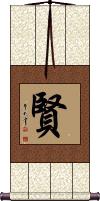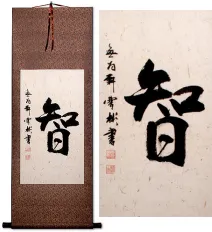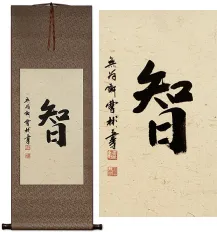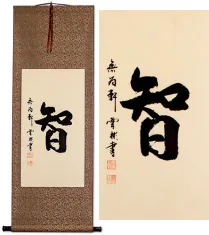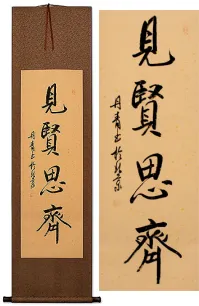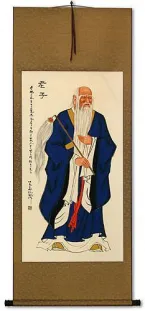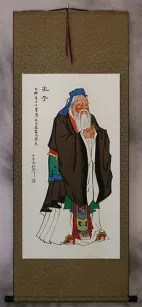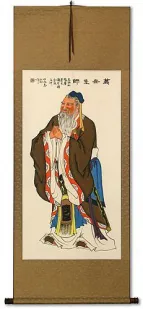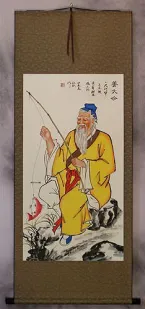Many custom options...
And formats...

Not what you want?
Try other similar-meaning words, fewer words, or just one word.
Wisdom Virtue in Chinese / Japanese...
Buy a Wisdom Virtue calligraphy wall scroll here!
Personalize your custom “Wisdom Virtue” project by clicking the button next to your favorite “Wisdom Virtue” title below...
The Five Tenets of Confucius
The Five Cardinal Rules / Virtues of Confucius
仁義禮智信 are the core of Confucius's philosophy.
Simply stated:
仁 = Benevolence / Charity
義 = Justice / Rectitude
禮 = Courtesy / Politeness / Tact
智 = Wisdom / Knowledge
信 = Fidelity / Trust / Sincerity
Many of these concepts can be found in various religious teachings. It should be clearly understood that Confucianism is not a religion but should instead be considered a moral code for a proper and civilized society.
This title is also labeled “5 Confucian virtues.”
![]() If you order this from the Japanese calligrapher, expect the middle Kanji to be written in a more simple form (as seen to the right). This can also be romanized as "jin gi rei satoshi shin" in Japanese. Not all Japanese will recognize this as Confucian tenets but they will know all the meanings of the characters.
If you order this from the Japanese calligrapher, expect the middle Kanji to be written in a more simple form (as seen to the right). This can also be romanized as "jin gi rei satoshi shin" in Japanese. Not all Japanese will recognize this as Confucian tenets but they will know all the meanings of the characters.
See Also: Confucius Teachings | Ethics
A Wise Man Changes His Mind (but a fool never will)
君子豹変す is a Japanese proverb that suggests that a wise man is willing to change his mind, but a fool will stubbornly never change his.
The first word is 君子 (kunshi), a man of virtue, a person of high rank, a wise man.
The second word is 豹変 (hyouhen), sudden change, complete change.
The last part, す (su), modifies the verb to a more humble form.
The “fool” part is merely implied or understood. So if wise and noble people are willing to change their minds, it automatically says that foolish people are unwilling to change.
Wise and Virtuous
賢 is used to refer to being a wise, trustworthy, and virtuous person. But it also contains the ideas of intelligence, genius, scholarship, virtue, sage, saint, good, and excellent in character.
賢 is used in Chinese, Japanese Kanji, and old Korean Hanja. Also used in a Buddhist context with the same meaning.
Note: Can also be the male given name, Masaru, in Japanese.
This in-stock artwork might be what you are looking for, and ships right away...
Gallery Price: $150.00
Your Price: $78.88
Gallery Price: $150.00
Your Price: $78.88
Gallery Price: $100.00
Your Price: $49.88
Gallery Price: $61.00
Your Price: $33.88
Gallery Price: $61.00
Your Price: $33.88
Gallery Price: $61.00
Your Price: $33.88
Gallery Price: $61.00
Your Price: $33.88
Gallery Price: $61.00
Your Price: $33.88
Not the results for wisdom virtue that you were looking for?
Below are some entries from our dictionary that may match your wisdom virtue search...
| Characters If shown, 2nd row is Simp. Chinese |
Pronunciation Romanization |
Simple Dictionary Definition |
七賢 七贤 see styles |
qī xián qi1 xian2 ch`i hsien chi hsien shichiken しちけん |
(1) (See 七賢人) the Seven Wise Men (of Confucius's Analects); (2) (See 竹林の七賢) Seven Sages of the Bamboo Grove (七賢位) Also七方便位, 七加行位 The seven grades or steps in virtue preceding the entry into見道faultless wisdom, or faultlessness in its first realization. These seven are preliminary to the七聖 (七聖位). Both are grades of the倶舍 Kośa school of Hīnayāna. |
三德 see styles |
sān dé san1 de2 san te santoku |
The three virtues or powers, of which three groups are given below. (1) (a) 法身德 The virtue or potency of the Buddha's eternal, spiritual body, the dharmakāya; (b) 般若德 of his prājñā, or wisdom, knowing all things in their reality; (c) 解脫德 of his freedom from all bonds and his sovereign Iiberty. Each of these has the four qualities of 常, 樂我, 淨eternity, joy, personality, and purity; v. 漫涅槃經 (2) (a) 智德 The potency of his perfect knowledge; (b) 斷德 of his cutting off all illusion and perfecting of supreme nirvāṇa; the above two are 自利 for his own advantage; (c) 恩德 of his universal grace and salvation, which 利他 bestows the benefits he has acquired on others. (3) (a) 因圓德 The perfection of his causative or karmic works during his three great kalpas of preparation; (b) 果圓德 the perfection of the fruit, or results in his own character and wisdom; (c) 恩圓德 the perfection of his grace in the salvation of others. |
上人 see styles |
shàng rén shang4 ren2 shang jen shounin / shonin しょうにん |
holy priest; saint; (place-name) Shounin A man of superior wisdom, virtue, and conduct, a term applied to monks during the Tang dynasty. |
前哲 see styles |
zentetsu ぜんてつ |
former men of wisdom and virtue |
十住 see styles |
shí zhù shi2 zhu4 shih chu jū jū |
The ten stages, or periods, in bodhisattva-wisdom, prajñā 般若, are the 十住; the merits or character attained are the 十地 q.v. Two interpretations may be given. In the first of these, the first four stages are likened to entry into the holy womb, the next four to the period of gestation, the ninth to birth, and the tenth to the washing or baptism with the water of wisdom, e.g. the baptism of a Kṣatriya prince. The ten stages are (1) 發心住 the purposive stage, the mind set upon Buddhahood; (2) 治地住 clear understanding and mental control; (3) 修行住 unhampered liberty in every direction; (4) 生貴住 acquiring the Tathāgata nature or seed; (5) 方便具足住 perfect adaptability and resemblance in self-development and development of others; (6) 正心住 the whole mind becoming Buddha-like; (7) 不退住 no retrogression, perfect unity and constant progress; (8) 童眞住 as a Buddha-son now complete; (9) 法王子住 as prince of the law; (10) 灌頂住 baptism as such, e.g. the consecration of kings. Another interpretation of the above is: (1) spiritual resolve, stage of śrota-āpanna; (2) submission to rule, preparation for Sakṛdāgāmin stage; (3) cultivation of virtue, attainment of Sakṛdāgāmin stage; (4) noble birth, preparation for the anāgāmin stage; (5) perfect means, attainment of anāgāmin stage; (6) right mind, preparation for arhatship; (7) no-retrogradation, the attainment of arhatship; (8) immortal youth, pratyekabuddhahood; (9) son of the law-king, the conception of bodhisattvahood; (10) baptism as the summit of attainment, the conception of Buddhahood. |
四法 see styles |
sì fǎ si4 fa3 ssu fa shihō |
There are several groups of four dharma: (1) 教法 the teaching of the Buddha); 理法 its principles, or meaning; 行法 its practice; 果法 its fruits or rewards. (2) Another group relates to bodhisattvas, their never losing the bodhi-mind, or the wisdom attained, or perseverance in progress, or the monastic forest life (āraṇyaka). (3) Also 信解行證 faith, discernment, performance, and assurance. (4) The Pure-land 'True' sect of Japan has a division: 教法, i. e. the 大無量壽經; 行法 the practice of the seventeenth of Amitābha's vows; 信法 faith in the eighteenth; and 證法 proof of the eleventh. The most important work of Shinran, the founder of the sect, is these four, i. e. 教行信證. (5) A 'Lotus ' division of 四法 is the answer to a question of Puxian (Samantabhadra) how the Lotus is to be possessed after the Buddha's demise, i. e. by thought (or protection) of the Buddhas; the cultivation of virtue; entry into correct dhyāna; and having a mind to save all creatures. |
文殊 see styles |
wén shū wen2 shu1 wen shu monju もんじゅ |
Manjushri, the Bodhisattva of keen awareness (Buddhist term) Manjushri; Manjusri; Bodhisattva that represents transcendent wisdom; (p,s,f) Monju (文殊師利) Mañjuśrī 滿殊尸利 -later 曼殊室利. 文殊 is also used for Mañjunātha, Mañjudeva, Mañjughoṣa, Mañjuṣvara, et al. T., hjamdpal; J., Monju. Origin unknown; presumably, like most Buddhas and bodhisattvas, an idealization of a particular quality, in his case of Wisdom. Mañju is beautiful, Śrī; good fortune, virtue, majesty, lord, an epithet of a god. Six definitions are obtained from various scriptures: 妙首 (or 頭 ) wonderful or beautiful) head; 普首 universal head; 濡首 glossy head (probably a transliteration); 敬首 revered head; 妙德 wonderful virtue (or power); 妙吉祥 wonderfully auspicious; the last is a later translation in the 西域記. As guardian of wisdom 智慧 he is often placed on Śākyamuni's left, with 普顯 on the right as guardian of law 理, the latter holding the Law, the former the wisdom or exposition of it; formerly they held the reverse positions. He is often represented with five curls or waves to his hair indicating the 五智 q. v. or the five peaks; his hand holds the sword of wisdom and he sits on a lion emblematic of its stern majesty: but he has other forms. He is represented as a youth, i. e. eternal youth. His present abode is given as east of the universe, known as 淸涼山 clear and cool mountain, or a region 寶住 precious abode, or Abode of Treasures, or 寶氏 from which he derives one of his titles, 寶相如來. One of his dhāraṇīs prophesies China as his post-nirvāṇa realm. In past incarnations he is described as being the parent of many Buddhas and as having assisted the Buddha into existence; his title was 龍種上佛 the supreme Buddha of the nāgas, also 大身佛 or 神仙佛; now his title is 歡喜藏摩尼寶精佛 The spiritual Buddha who joyfully cares for the jewel: and his future title is to be 普現佛 Buddha universally revealed. In the 序品 Introductory Chapter of the Lotus Sutra he is also described as the ninth predecessor or Buddha-ancestor of Śākyamuni. He is looked on as the chief of the Bodhisattvas and represents them, as the chief disciple of the Buddha, or as his son 法王子. Hīnayāna counts Śāriputra as the wisest of the disciples, Mahāyāna gives Mañjuśrī the chief place, hence he is also styled 覺母 mother, or begetter of understanding. He is shown riding on either a lion or a peacock, or sitting on a white lotus; often he holds a book, emblem of wisdom, or a blue lotus; in certain rooms of a monastery he is shown as a monk; and he appears in military array as defender of the faith. His signs, magic words, and so on, are found in various sutras. His most famous centre in China is Wu-tai shan in Shansi. where he is the object of pilgrimages, especially of Mongols. The legends about him are many. He takes the place in Buddhism of Viśvakarman as Vulcan, or architect, of the universe. He is one of the eight Dhyāni-bodhisattvas, and sometimes has the image of Akṣobhya in his crown. He was mentioned in China as early as the fourth century and in the Lotus Sutra he frequently appears, especially as the converter of the daughter of the Dragon-king of the Ocean. He has five messengers 五使者 and eight youths 八童子 attending on him. His hall in the Garbhadhātu maṇḍala is the seventh, in which his group numbers twenty-five. His position is northeast. There are numerous sutras and other works with his name as title, e. g. 文殊師利問菩提經 Gayaśīrṣa sūtra, tr. by Kumārajīva 384-417: and its 論 or .Tīkā of Vasubandhu, tr. by Bodhiruci 535. see list in B. N. |
父母 see styles |
fù mǔ fu4 mu3 fu mu fubo(p); chichihaha; tetehaha(ok); kazoiroha(ok); bumo(ok); kazoiro(ok) ふぼ(P); ちちはは; ててはは(ok); かぞいろは(ok); ぶも(ok); かぞいろ(ok) |
father and mother; parents father and mother; parents; (surname) Fubo pitṛ-mātṛ, father and mother, parents; 無明 ignorance is referred to as father, and 貪愛 desire, or concupiscence, as mother, the two— ignorance and concupiscence— being the parents of all delusion and karma. Samādhi is also referred to as father, and praj na (wisdom) as mother, the parents of all knowledge and virtue. In the vast interchanges of rebirth all have been or are my parents, therefore all males are my father and all females my mother: 一切男女我父母 see 心地觀經 2. |
福慧 see styles |
fú huì fu2 hui4 fu hui fukue |
Blessedness and wisdom; or virtue and wisdom. |
大智德 see styles |
dà zhì dé da4 zhi4 de2 ta chih te dai chitoku |
one who possesses great wisdom and virtue |
根本智 see styles |
gēn běn zhì gen1 ben3 zhi4 ken pen chih konpon chi |
Fundamental, original, or primal wisdom, source of all truth and virtue; knowledge of fundamental principles; intuitive knowledge or wisdom, in contrast with acquired wisdom. |
三身三德 see styles |
sān shēn sān dé san1 shen1 san1 de2 san shen san te sanshin sandoku |
The 三身 are the 法, 報, and 應; the 三德 are 法, 般, and 解, i.e. the virtue, or merit, of the (a) 法身 being absolute independence, reality; of (b) 報身, being 般若 prajñā or wisdom; and of (c) 應身, being 解脫德 liberation, or Nirvāṇa. |
五種法身 五种法身 see styles |
wǔ zhǒng fǎ shēn wu3 zhong3 fa3 shen1 wu chung fa shen goshu hosshin |
The five kinds of a Buddha's dharmakāya. There are four groups. I. (1) 如如智法身 the spiritual body of bhūtatathatā-wisdom; (2) 功德法身 of all virtuous achievement; (3) 自法身 of incarnation in the world; (4) 變化法身 of unlimited powers of transformation; (5) 虛空法身 of unlimited space; the first and second are defined as saṃbhogakāya, the third and fourth as nirmāṇakāya, and the fifth as the dharmakāya, but all are included under dharmakāya as it possesses all the others. II. The esoteric cult uses the first four and adds as fifth 法界身 indicating the universe as pan-Buddha. III. Huayan gives (1) 法性生身 the body or person of Buddha born from the dharma-nature. (2) 功德生身 the dharmakāya evolved by Buddha virtue, or achievement; (3) 變化法身 the dharmakāya with unlimited powers of transformation; (4) 實相法身 the real dharmakāya; (5) 虛 空法身 the universal dharmakāya. IV. Hīnayāna defines them as 五分法身 q. v. |
佛具十身 see styles |
fó jù shí shēn fo2 ju4 shi2 shen1 fo chü shih shen butsugu jūshin |
The ten perfect bodies or characteristics of Buddha: (1) 菩提身 Bodhi-body in possession of complete enlightenment. (2) 願身 Vow-body, i.e. the vow to be born in and from the Tuṣita heaven. (3) 化身 nirmāṇakāya, Buddha incarnate as a man. (4) 住持身 Buddha who still occupies his relics or what he has left behind on earth and thus upholds the dharma. (5) 相好莊嚴身 saṁbhogakāya, endowed with an idealized body with all Buddha marks and merits. (6) 勢力身 or 心佛 Power-body, embracing all with his heart of mercy. (7) 如意身 or 意生身 At will body, appearing according to wish or need. (8) 福德身 or 三昧身 samādhi body, or body of blessed virtue. (9) 智身 or 性佛 Wisdom-body, whose nature embraces all wisdom. (10) 法身 dharmakāya, the absolute Buddha, or essence of all life. |
十六大力 see styles |
shí liù dà lì shi2 liu4 da4 li4 shih liu ta li jūroku dairiki |
The sixteen great powers obtainable by a bodhisattva, i.e. of will, mind, action, shame (to do evil), energy, firmness, wisdom, virtue, reasoning, personal appearance, physical powers, wealth, spirit, magic, spreading the truth, subduing demons. |
福智資糧 福智资粮 see styles |
fú zhì zī liáng fu2 zhi4 zi1 liang2 fu chih tzu liang fukuchi shiryō |
accumulation of virtue and wisdom |
聖人賢者 see styles |
seijinkenja / sejinkenja せいじんけんじゃ |
person of lofty virtue and great wisdom |
般若波羅蜜 般若波罗蜜 see styles |
bō rě bō luó mì bo1 re3 bo1 luo2 mi4 po je po lo mi hannyaharamitsu はんにゃはらみつ |
{Buddh} prajna-paramita (perfection of wisdom) (般若波羅蜜多) prajñā-pāramitā, The acme of wisdom, enabling one to reach the other shore, i.e. wisdom for salvation; the highest of the six paramitas, the virtue of wisdom as the notes a knowledge of the illusory character of everything earthly, and destroys error, ignorance, prejudice, and heresy. For the sutra of this name see below. |
The following table may be helpful for those studying Chinese or Japanese...
| Title | Characters | Romaji (Romanized Japanese) | Various forms of Romanized Chinese | |
| The Five Tenets of Confucius | 仁義禮智信 仁义礼智信 | jin gi rei tomo nobu jingireitomonobu | rén yì lǐ zhì xìn ren2 yi4 li3 zhi4 xin4 ren yi li zhi xin renyilizhixin | jen i li chih hsin jenilichihhsin |
| A Wise Man Changes His Mind (but a fool never will) | 君子豹変す | kun shi hyou hen su kunshihyouhensu kun shi hyo hen su | ||
| Wise and Virtuous | 賢 贤 | ken | xián / xian2 / xian | hsien |
| In some entries above you will see that characters have different versions above and below a line. In these cases, the characters above the line are Traditional Chinese, while the ones below are Simplified Chinese. | ||||
Successful Chinese Character and Japanese Kanji calligraphy searches within the last few hours...


